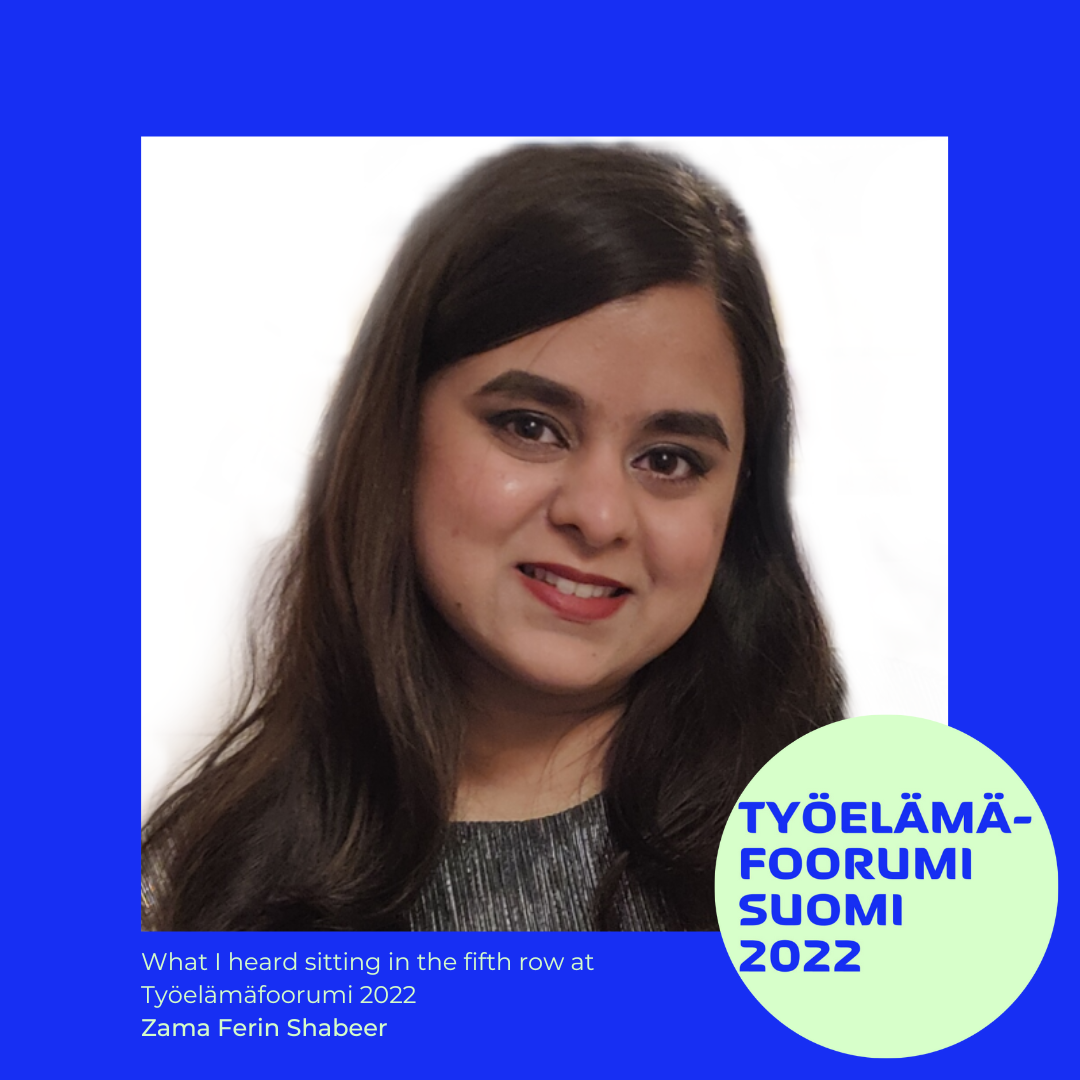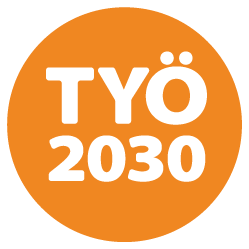What I heard sitting in the 5th row at Work Life Forum... (Part 2)
Monday, 28. November 2022

Zama is a communications trainee at the WORK2030 Program. She is also a business and languages student at Haaga-Helia University of Applied Sciences.
What I heard sitting in the 5th row at Work Life Forum 2022...
In the first part of this blog, I briefly described the essence of the discussions at the morning sessions of the first ever Work Life Forum Finland 2022. In this second part, I write about the discussions and keynotes that followed in the afternoon sessions, and share a bit more about my thesis.
During lunch, conversation flowed, ideas were hypothesized, and connections were made – with a beautiful performance by Pekka Niemi (ONEVIOLIN), which intended to lighten the mood, but instead wound up astonishing the audience.
The audience returned refreshed and Olli Rehn, CEO of The Bank of Finland began the afternoon by underlining that restoring confidence in the labor market is important. In the panel that followed, Rehn discussed Finland’s economy, competitiveness, and productivity with Leena Mörttinen (Ministry of Finance), Doctor of political science Sixten Korkman, and Suvi-Anne Siimes (CEO, TELA). Surviving without work-based immigration was deemed unlikely and maintaining Finland’s image as a great place to live and work while competing with other European countries for the same talent was deemed important.
Professor of Management Alf Rehn followed with a speech about the changes in management, with the advancements in technology, and especially automation. Rehn pointed out that managers with diverse backgrounds can be freed from many routines in the future, thanks to automation, and their time and energy can be used to develop new possibilities for a more equal work life.
However, in the next panel discussion, Ville Simola (CEO, Maria01), Yacine Samb (Google), Taina Susiluoto (Finnish Olympic Committee) and Mari Männistö (National Chairman, JCI) unanimously agreed that though management can surely benefit from technology, it is human work. The things that are important for employees – psychological safety, inclusion, recognition – which are to be promoted by the manager, remain the same, even if the tools and tactics change.
In the last panel of the event, Agnes Parent-Thirion (Eurofound) opened up a discussion about how Finland fares in international competition, with Hanna Sutela (Statistics Finland), Nina Kopola (Business Finland) and Camilla Weurlander (IKEA Finland). Finland is a good model for equality, however, there is still work to be done with diversity, which engages personnel and promotes employer image.
Actor Jasper Pääkkönen spoke about what makes Finland attractive, suggesting that many valuable nuances i.e. sauna, sauna culture and Finnish nature, are so obvious to those familiar with them, that their significance is not understood or communicated well enough. I was amused by his remark about Finns always asking why on earth someone would want to come to Finland. It just goes to show that modesty runs deep in this country.
The event was attended by a large audience both at Pikku-Finlandia as well as through online streaming. The discussions were in Finnish, and I must admit that as an intermediate-level Finnish learner, some of them were slightly hard to follow due to unfamiliar terminology. Further, as a communications professional, while I am in awe of the initiative to start a discourse about working life in Finland, a question irks me – What and who is missing?
How do we involve the many thousands of international employees who call Finland their home but who do not speak Finnish in this initiative to build the best working life in the world? How can the language barrier be transcended to include everyone, without undermining the importance of the Finnish language?
What are other countries in Europe and globally doing to address the issues in working life? How can we learn from each other, collaborate, and network? These are the questions that inspired my thesis as a business student majoring in communications at Haaga-Helia University of Applied Sciences – ‘Communicating about National Development Programs in Finland to an International Audience’ – which I will be working on in the coming months.
The first national Work Life Forum Finland came to an end, with Liisa Hakala’s (Ministry of Social Affairs) eloquent and precise words – ‘We are really proud of who we are and where we are, but we boldly look forward and take on the challenges and excellent opportunities to create the best working life in the world.’
You can read more about the WORK2030 Program here.
- Etusivu
- Tietoa ohjelmasta
- Tulevaisuusvuoropuhelu
- Työkaluja
- Johtajuuden kehittäminen
- Työelämän tilannekuva
- Hybridityö, etätyö ja lähityö (HELP)
- Hyvinvointia työstä 2030-luvulla
- Kohti työtä 2030 -webinaarit
- MEADOW-tutkimus
- MEADOW ICT-alan juttusarja
- Sujuvaa aivotyötä opetusalalle
- Työelämäfoorumi Suomi 2026
- Työelämätapahtumia
- Työelämän tilannekuvia
- Työmarkkinajärjestöjen vuoropuhelu digitalisaatiosta
- Työ nyt ja tulevaisuudessa: Eväitä ajatteluun luentosarja
- Viisi ratkaisua tulevaisuuden työelämään
- Viestintä ja kampanjat
